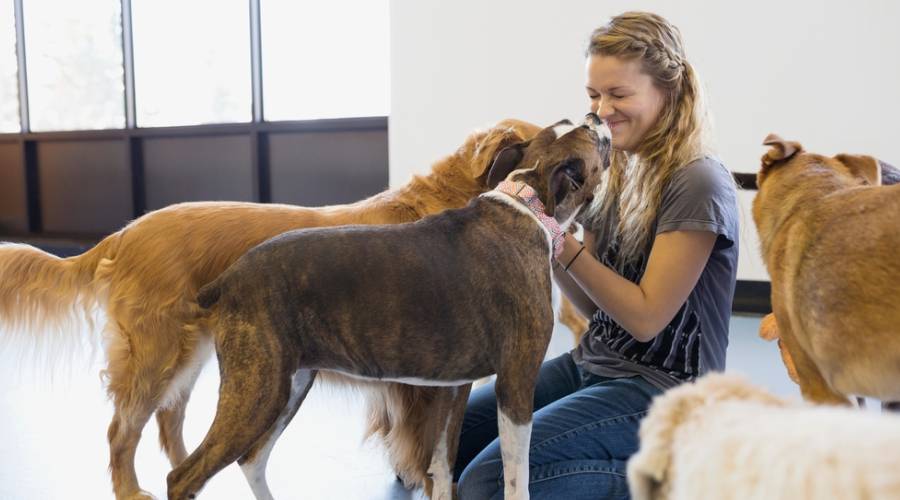Dog day care facilities offer a well-organized and secure setting where your canine friends can participate in numerous activities while being monitored by vigilant staff. These centers are a perfect option for busy pet parents looking to guarantee their furry companions receive proper care throughout the day. More than just providing care, these facilities significantly contribute to resolving behavioral problems in dogs, thereby enhancing their overall health and happiness.
Importance of Addressing Behavioral Issues in Dogs
Your furry friends can experience a variety of behavioral issues, from minor inconveniences to severe problems that impact both their well-being and their owners’ tranquility. Tackling these issues is crucial for their mental and physical health and for ensuring a peaceful home environment. Such problems may arise from different causes, such as inadequate socialization, anxiety, or insufficient training.
Common Behavioral Challenges Faced by Canines
Separation Anxiety
Pups with separation anxiety undergo severe distress when left by themselves, resulting in destructive actions and excessive vocalization.
Aggression
Dogs may exhibit aggression towards other canines, people, or both, posing a significant safety risk.
Excessive Barking
Uncontrollable barking may indicate deeper problems like monotony, unease, or a longing for interaction.
Destructive Behavior
Behaviors like furniture gnawing or excessive digging frequently stem from monotony, anxiety, or a lack of physical activity.
Socialization Problems
Canines with inadequate socialization may exhibit fear or hostility towards both other dogs and people, transforming outings into tense and challenging situations.
How Daycare Centers Tackle Such Problems?
Separation Anxiety
- Consistent Human and Canine Interaction: Consistent engagement with humans and fellow dogs significantly reduces feelings of isolation and stress.
- Structured Routine and Activities: A stable daily routine offers a sense of stability, which helps to alleviate anxiety.
- Reduced Stress Levels Through Supervised Play: Engaging in stimulating activities and monitored playtime lowers stress levels, aiding dogs in adapting more easily to being away from their owners.
Aggression Management
- Expert Supervision and Intervention: Proficient personnel are capable of recognizing initial indicators of aggression and intervening effectively.
- Controlled Socialization with Other Pups: Structured environments allow for controlled interactions, reducing aggressive tendencies.
- Positive Reinforcement Techniques: Reward-based training methods encourage positive behavior, reducing aggression.
Excessive Barking
- Engagement in Stimulating Activities: Keeping dogs mentally and physically stimulated reduces boredom and, consequently, barking.
- Regular Exercise to Reduce Pent-up Energy: Adequate exercise helps burn off excess energy that might otherwise be expressed through barking.
- Training and Correction by Skilled Staff: Skilled staff can implement training techniques to address and reduce excessive barking.
Destructive Behavior
- Access to Toys and Enrichment Programs: Offering an assortment of toys and activities keeps dogs engaged and mentally stimulated.
- Continuous Supervision Preventing Boredom: Constant supervision ensures that dogs are engaged and not left to their own devices to become destructive.
- Implementation of Positive Behavior Strategies: Positive reinforcement encourages good behavior and discourages destructive habits.
Improving Socialization Skills
- Regular Interaction with a Variety of Dogs: Frequent interaction with different dogs helps improve social skills and reduces fear or aggression.
- Monitored Playgroups to Ensure Safety and Compatibility: Playgroups are carefully monitored to ensure safe and positive interactions.
- Exposure to Different Environments and Stimuli: Varying environments and stimuli help dogs become more adaptable and less fearful.
Selecting the Appropriate Daycare for Dogs
When selecting a daycare center for your canine friend, consider these important factors:
- Staff Expertise: Verify that the staff is skilled in dog behavior, first aid, and positive reinforcement techniques.
- Staff-to-Dog Ratio: A low number of dogs per staff member ensures each dog receives ample attention and supervision.
- Cleanliness of Facility: A clean and hygienic environment is crucial for your pet’s health and well-being.
- Program structure: Choose a pet day care with a structured schedule that includes playtime, rest periods, and training activities.
- Evaluation Process: The daycare should conduct a thorough assessment of each dog’s temperament and behavior before acceptance.
- Emergency Procedures: Inquire about the emergency protocols for medical situations and natural disasters.
- Communication: Opt for a daycare that maintains open communication with pet owners, providing regular updates on their dog’s behavior and health.
- Additional Services: Some centers, like Rancho Relaxo, offer extra services such as grooming, training, and dog boarding.
- Facilities and Amenities: Look for amenities like outdoor play areas, swimming pools, and climate-controlled environments.
- Customized Care: Ensure the daycare can cater to any special needs your dog may have, such as specific dietary or medical requirements.
- Behavioral Suitability: The facility should be capable of managing your dog’s unique behavioral traits, whether they are shy, energetic, or have other specific characteristics
Guidelines for Owners Preparing Their Pups for Daycare
- Ease into the Experience: Introduce your beloved companion to the daycare setting gradually to minimize any potential stress.
- Share Vital Details: Communicate with the daycare staff about your pup’s temperament, preferences, and any specific requirements.
- Maintain Vaccination Records: Ensure your dog’s vaccinations are up-to-date to safeguard the health and well-being of other pets at the facility.
Conclusion
Dog day care centers offer a valuable service beyond basic care, significantly impacting the management and improvement of behavioral issues in dogs. By providing a structured, engaging, and professionally supervised environment, daycare can help alleviate challenges faced by your beloved pup and enhance their quality of life.


